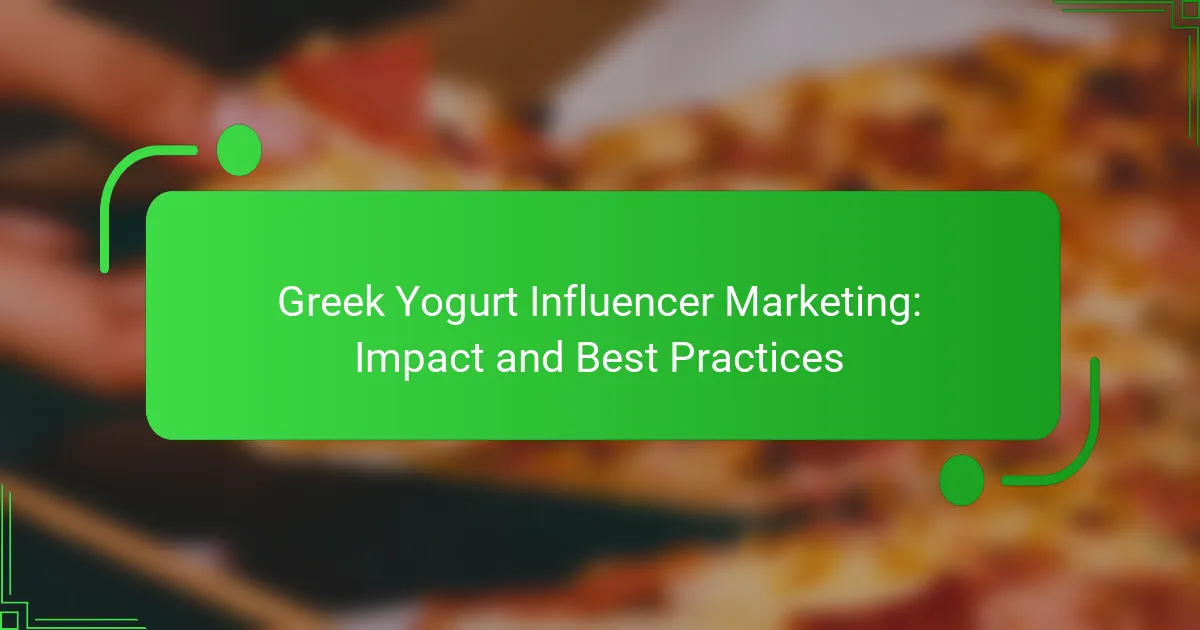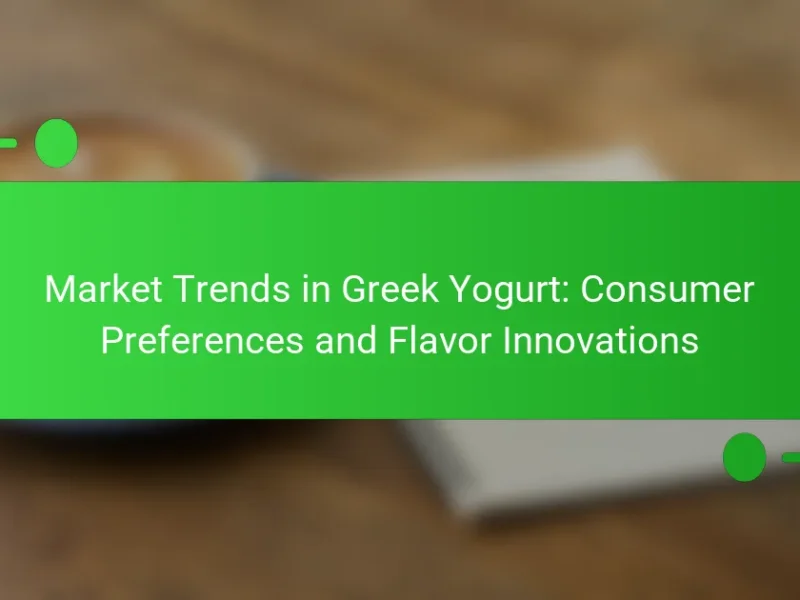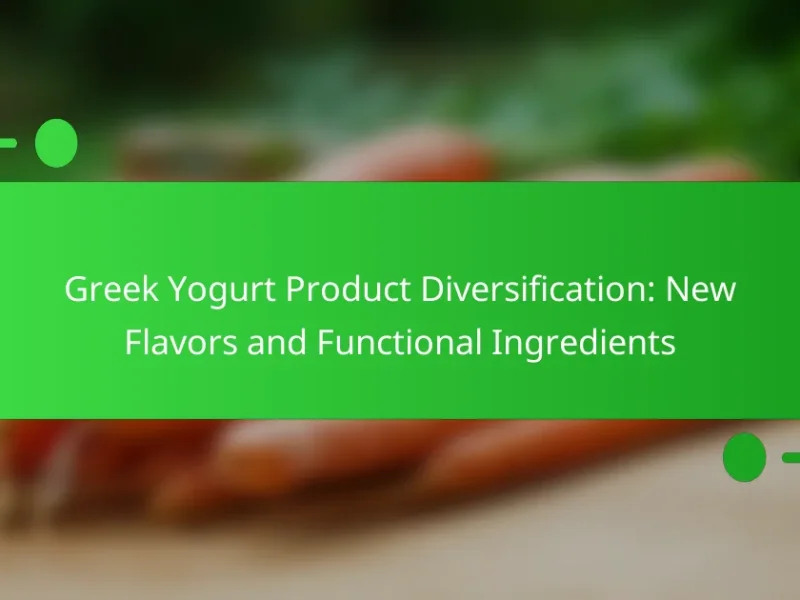Greek Yogurt Influencer Marketing is a strategic approach that utilizes social media influencers to promote Greek yogurt products, leveraging their credibility and reach to engage health-conscious consumers. This article outlines the best practices for brands looking to implement this marketing strategy, including identifying suitable influencers, creating authentic content that highlights the health benefits of Greek yogurt, and monitoring campaign effectiveness. It also addresses challenges such as maintaining authenticity in partnerships, navigating health claim regulations, and measuring return on investment. By exploring these aspects, the article provides a comprehensive guide for Greek yogurt brands aiming to enhance their presence through influencer marketing.
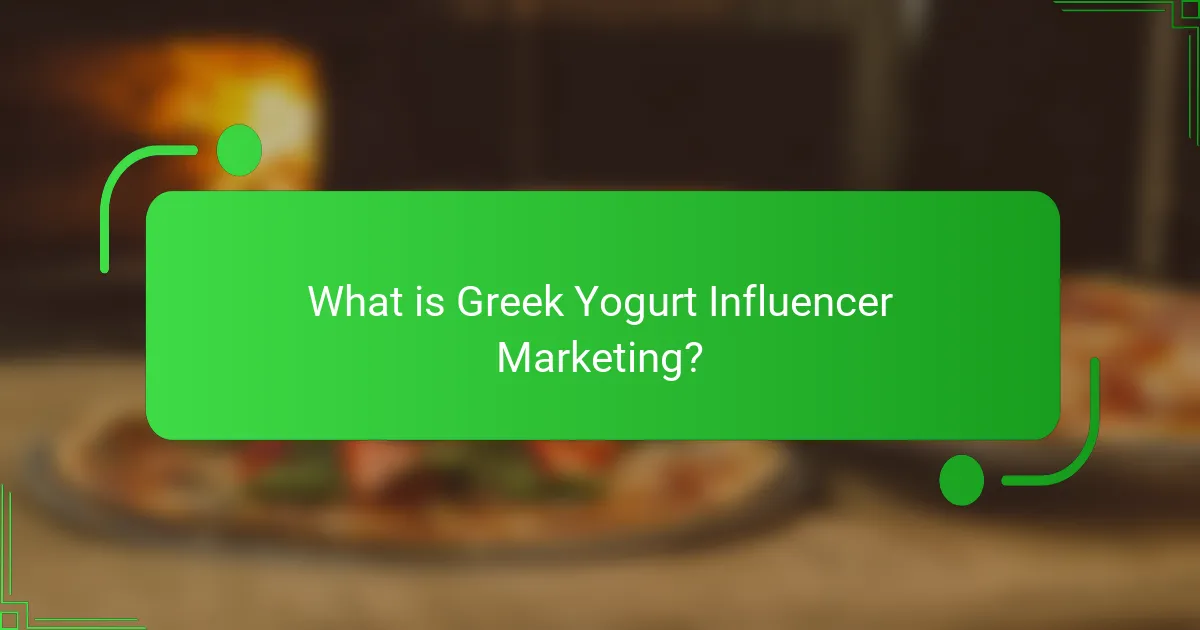
What is Greek Yogurt Influencer Marketing?
Greek Yogurt Influencer Marketing is a strategy that leverages social media influencers to promote Greek yogurt products. This marketing approach utilizes influencers’ credibility and reach to engage their followers. Brands partner with influencers who align with their target audience. The goal is to create authentic content that showcases the benefits and versatility of Greek yogurt. Research shows that influencer marketing can yield a return on investment of up to $6.50 for every dollar spent. By utilizing influencers, brands can effectively increase awareness and drive sales.
How does influencer marketing apply to the Greek yogurt industry?
Influencer marketing significantly impacts the Greek yogurt industry by leveraging social media personalities to promote products. Influencers create authentic content that resonates with their followers. This approach increases brand visibility and consumer trust. Research shows that 49% of consumers rely on influencer recommendations for their purchasing decisions. Influencers often highlight the health benefits and versatility of Greek yogurt in their posts. They can showcase recipes, lifestyle integrations, and unique product offerings. This strategy effectively engages target audiences and drives sales. Brands in the Greek yogurt sector have reported increased engagement and sales due to influencer collaborations.
What roles do influencers play in promoting Greek yogurt?
Influencers play a crucial role in promoting Greek yogurt. They create engaging content that showcases the product’s versatility and health benefits. This content often includes recipes, meal ideas, and personal testimonials. Influencers help build brand awareness by reaching a large and targeted audience. Their authentic endorsements can increase consumer trust and drive purchasing decisions. Studies show that influencer marketing can lead to a significant boost in sales. For instance, brands that collaborate with influencers often see a return on investment of up to $6.50 for every dollar spent. Overall, influencers serve as effective advocates for Greek yogurt in the health and wellness market.
What types of influencers are most effective for Greek yogurt brands?
Micro-influencers are most effective for Greek yogurt brands. They typically have between 1,000 to 100,000 followers. Their engagement rates are often higher than those of macro-influencers. Micro-influencers usually have a niche audience that trusts their recommendations. This trust translates into higher conversion rates for products like Greek yogurt. Studies show that consumers are more likely to purchase from brands endorsed by relatable figures. Additionally, collaborations with health and wellness influencers can enhance brand credibility. These influencers often share recipes and health tips involving Greek yogurt, creating authentic content.
Why is influencer marketing important for Greek yogurt brands?
Influencer marketing is important for Greek yogurt brands because it enhances brand visibility and credibility. Influencers have established trust with their followers, making their endorsements more impactful. According to a survey by Nielsen, 92% of consumers trust recommendations from individuals over brands. This trust translates into higher engagement rates for Greek yogurt products. Influencer campaigns can also target specific demographics effectively. For example, health and wellness influencers can reach consumers interested in nutritious food options. Additionally, influencer marketing can lead to increased sales and market share for Greek yogurt brands. A study by Influencer Marketing Hub found that businesses earn an average of $5.78 for every dollar spent on influencer marketing.
How does influencer marketing impact brand awareness for Greek yogurt?
Influencer marketing significantly enhances brand awareness for Greek yogurt. Influencers create authentic connections with their followers. Their endorsements can lead to increased visibility for Greek yogurt brands. Research indicates that 49% of consumers depend on influencer recommendations. This can drive consumer interest and engagement. Additionally, influencers often showcase the product in appealing contexts. This visual representation can make Greek yogurt more relatable and desirable. Brands that collaborate with influencers see a measurable uptick in social media mentions and website traffic.
What are the measurable outcomes of influencer marketing in this sector?
Measurable outcomes of influencer marketing in the Greek yogurt sector include increased brand awareness, engagement rates, and sales conversions. Influencer campaigns can lead to a 10-20% rise in brand awareness among target audiences. Engagement rates often see a boost of 2-5% when influencers promote Greek yogurt products. Additionally, sales conversions can improve by 15-30% following successful influencer partnerships. These metrics are tracked through social media analytics and sales data. Brands often use unique promo codes or trackable links to measure direct sales impact from influencer campaigns.
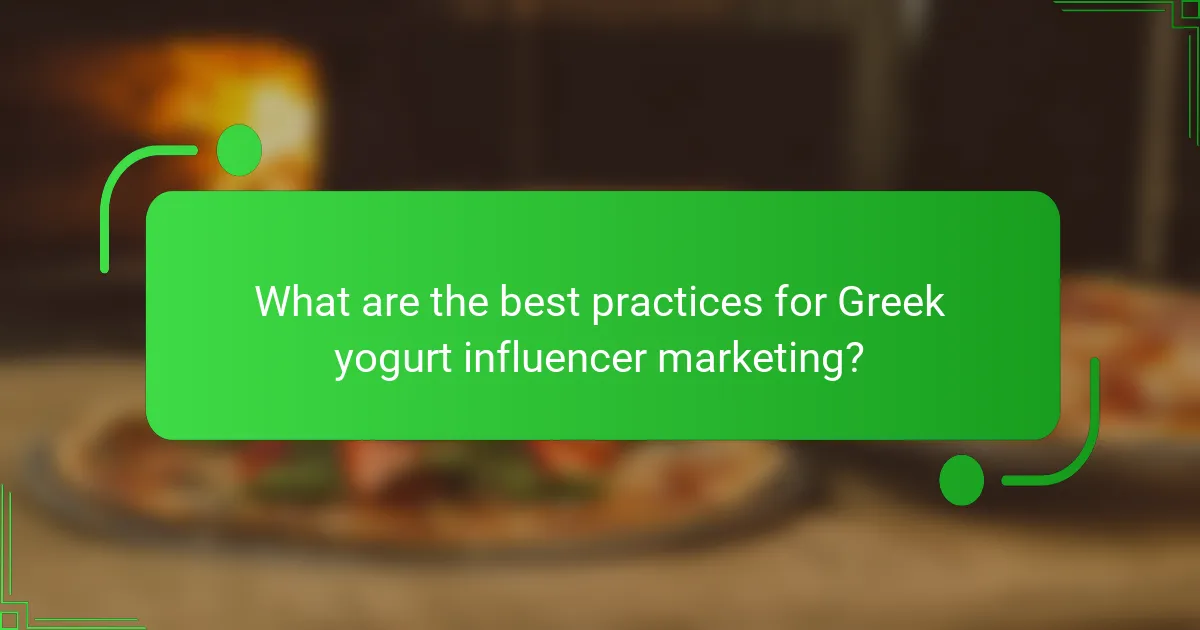
What are the best practices for Greek yogurt influencer marketing?
Identify the right influencers who align with the Greek yogurt brand’s values. Research their audience demographics to ensure a good fit. Create engaging content that highlights the unique benefits of Greek yogurt, such as its high protein content. Encourage influencers to share personal stories or recipes using Greek yogurt. Utilize authentic visuals to showcase the product in real-life settings. Monitor engagement metrics to assess the campaign’s effectiveness. Adjust strategies based on feedback and performance data. Collaborate on giveaways or challenges to increase audience interaction.
How can brands identify the right influencers for their Greek yogurt campaigns?
Brands can identify the right influencers for their Greek yogurt campaigns by analyzing audience alignment. They should assess the influencer’s follower demographics to ensure they match the target market for Greek yogurt. Engagement rates are also crucial; brands should prioritize influencers with high interaction levels on their posts.
Brands can utilize tools like social media analytics platforms to evaluate these metrics. Additionally, reviewing past content can reveal the influencer’s authenticity and relevance to health or food topics. Collaborations with influencers who have a history of promoting dairy or healthy eating can enhance campaign effectiveness.
Research indicates that 49% of consumers rely on influencer recommendations for food products. This statistic underscores the importance of selecting credible influencers who resonate with the audience. By focusing on these criteria, brands can effectively connect with the right influencers for their campaigns.
What criteria should be used to evaluate potential influencers?
Evaluate potential influencers based on their audience engagement, relevance, and authenticity. Audience engagement indicates how actively followers interact with the influencer’s content. High engagement rates suggest a loyal and interested audience. Relevance assesses the influencer’s alignment with the Greek yogurt brand and target market. Influencers should create content related to health, nutrition, or food to resonate with the audience. Authenticity refers to the influencer’s genuine connection with their followers. Authentic influencers build trust, making their endorsements more impactful. Brands often look for influencers with a proven track record of successful partnerships. Metrics such as follower count, engagement rate, and previous campaign performance provide concrete data for evaluation.
How can brands assess an influencer’s audience engagement?
Brands can assess an influencer’s audience engagement by analyzing metrics such as likes, comments, shares, and overall interaction rates. These metrics provide insight into how actively the audience responds to the influencer’s content. Engagement rates can be calculated by dividing the total interactions by the number of followers. For example, a post with 500 likes and 100 comments from an influencer with 10,000 followers results in a 6% engagement rate. Additionally, brands can use tools like social media analytics platforms to track these metrics over time. This data helps brands understand the influencer’s effectiveness in reaching and engaging their audience.
What strategies can enhance the effectiveness of influencer partnerships?
Selecting influencers whose values align with the brand enhances partnership effectiveness. This alignment fosters authenticity and trust among the audience. Creating clear and measurable goals for the partnership is essential. Goals could include engagement rates, reach, or conversion metrics. Providing influencers with creative freedom leads to more genuine content. Influencers often know their audience best and can tailor messages accordingly. Regular communication ensures alignment throughout the campaign. It allows for adjustments based on performance and audience feedback. Offering exclusive promotions or giveaways can incentivize audience engagement. This strategy can drive traffic and increase brand visibility. Tracking and analyzing campaign performance helps refine future partnerships. Data-driven insights inform better decision-making for subsequent influencer collaborations.
How can brands create compelling campaigns with influencers?
Brands can create compelling campaigns with influencers by aligning their values and goals with those of the influencers. This alignment ensures authentic messaging that resonates with the target audience. Brands should select influencers who have a genuine interest in their products, such as Greek yogurt. Engaging influencers with strong audience connections can enhance credibility and trust.
Additionally, brands must provide influencers with creative freedom to convey their message. This approach fosters originality and encourages the influencer’s unique style. Brands should also leverage data analytics to measure campaign performance. Tracking engagement metrics helps refine strategies for future campaigns.
According to a study by Influencer Marketing Hub, 63% of marketers plan to increase their influencer marketing budgets in the coming year. This statistic highlights the effectiveness of influencer partnerships in driving brand awareness and sales.
What types of content resonate best with audiences in Greek yogurt marketing?
Visual content, such as vibrant images and videos of Greek yogurt dishes, resonates best with audiences in Greek yogurt marketing. This type of content showcases the product’s versatility and appeal. Engaging recipes and health benefits presented visually attract consumer interest. Influencer partnerships amplify this impact by providing authentic testimonials. User-generated content also fosters community engagement and trust. According to a study by HubSpot, 54% of consumers prefer visual content over other types. Therefore, leveraging visual storytelling is crucial for effective Greek yogurt marketing.

What challenges do Greek yogurt brands face in influencer marketing?
Greek yogurt brands face several challenges in influencer marketing. One challenge is finding influencers whose audience aligns with health-conscious consumers. Many influencers may not have a focus on nutrition or wellness. Another challenge is managing the authenticity of influencer partnerships. Consumers can be skeptical of sponsored content that appears inauthentic. Additionally, brands must navigate varying regulations regarding health claims in influencer promotions. This can complicate messaging and limit what influencers can say about the product. Moreover, competition among brands for influencer attention can dilute individual campaigns. Lastly, measuring the effectiveness of influencer marketing can be difficult. Brands often struggle to quantify the return on investment from these partnerships.
How can brands overcome common obstacles in influencer collaborations?
Brands can overcome common obstacles in influencer collaborations by establishing clear communication and setting mutual expectations. Clear communication helps align objectives between the brand and the influencer. Setting mutual expectations ensures both parties understand their roles and deliverables. This approach minimizes misunderstandings and enhances collaboration effectiveness. Research indicates that 65% of brands experience challenges due to lack of clarity in influencer partnerships. By providing detailed briefs and guidelines, brands can facilitate smoother interactions. Additionally, fostering a relationship built on trust encourages influencers to represent the brand authentically. This authenticity can lead to higher engagement rates and better campaign outcomes.
What are the risks associated with influencer marketing in the food industry?
The risks associated with influencer marketing in the food industry include misinformation, loss of credibility, and legal issues. Misinformation can arise when influencers promote products without proper knowledge, leading to consumer confusion. Loss of credibility occurs if influencers endorse unhealthy products, damaging their reputation and that of the brand. Legal issues may arise from non-disclosure of paid partnerships, which can lead to fines and damage to brand trust. According to the Federal Trade Commission, influencers must disclose their relationships with brands to avoid misleading consumers.
How can brands maintain authenticity in influencer partnerships?
Brands can maintain authenticity in influencer partnerships by selecting influencers who genuinely align with their values. Authentic influencers have a loyal audience that trusts their recommendations. Brands should prioritize transparency in their collaborations. Clear disclosure of paid partnerships enhances credibility. Engaging influencers in the creative process fosters genuine content. This approach allows for authentic storytelling that resonates with audiences. Regular communication with influencers ensures alignment on brand messaging. Studies show that 86% of consumers value authenticity in influencer marketing. This statistic highlights the importance of maintaining trust and credibility in partnerships.
What are the future trends in Greek yogurt influencer marketing?
Future trends in Greek yogurt influencer marketing include a focus on authenticity and niche targeting. Brands are increasingly collaborating with micro-influencers who have dedicated followings. This approach fosters a sense of community and trust among consumers. Data shows that micro-influencers often achieve higher engagement rates than larger influencers. Additionally, video content is becoming more prominent, with platforms like TikTok driving this trend. Short, engaging videos showcasing recipes or health benefits resonate well with audiences. Sustainability is also gaining traction, as consumers prefer brands that align with eco-friendly practices. Influencers who highlight these values can enhance brand loyalty. Overall, the landscape is evolving towards more personalized and genuine marketing strategies.
How is consumer behavior evolving in relation to influencer marketing?
Consumer behavior is evolving towards a greater reliance on authenticity and relatability in influencer marketing. Consumers increasingly prefer influencers who share genuine experiences with products. This shift is driven by a growing skepticism towards traditional advertising methods. According to a 2022 survey by HubSpot, 81% of consumers trust the advice of influencers over that of brands. Additionally, consumers are more likely to engage with micro-influencers, who typically have smaller but more engaged audiences. This trend suggests that personalized content is becoming more influential in purchasing decisions. Overall, consumer behavior is moving towards valuing transparency and community in influencer marketing.
What innovations are emerging in influencer marketing strategies for Greek yogurt?
Emerging innovations in influencer marketing strategies for Greek yogurt include interactive content and personalized campaigns. Brands are leveraging augmented reality (AR) to create immersive experiences. Influencers are now engaging audiences through live cooking demonstrations featuring Greek yogurt recipes. Collaborations with nutritionists and dietitians are becoming common to enhance credibility.
User-generated content is encouraged to foster community involvement. Brands utilize data analytics to identify micro-influencers with high engagement rates. Social media platforms are increasingly being used for exclusive promotions and giveaways. These strategies aim to create authentic connections with consumers while promoting Greek yogurt’s health benefits.
What practical tips can enhance Greek yogurt influencer marketing efforts?
Engaging relevant influencers can enhance Greek yogurt marketing efforts. Choose influencers who align with health and wellness niches. Authenticity is crucial; select those who genuinely enjoy Greek yogurt. Collaborate on recipes or meal ideas featuring the product. Encourage influencers to share personal stories about Greek yogurt benefits. Utilize visually appealing content to attract attention on social media. Track engagement metrics to assess campaign effectiveness. According to a 2021 survey, 49% of consumers trust influencer recommendations. This statistic underscores the importance of influencer credibility in marketing.
Greek Yogurt Influencer Marketing is a strategic approach that utilizes social media influencers to promote Greek yogurt products, enhancing brand visibility and consumer trust. The article examines the impact of influencer marketing on the Greek yogurt industry, detailing the roles influencers play, effective types of influencers, and the importance of authenticity. It also outlines best practices for identifying suitable influencers, measuring campaign outcomes, and overcoming common challenges. Additionally, the article highlights future trends, innovations, and practical tips to optimize influencer marketing efforts in the Greek yogurt sector.
